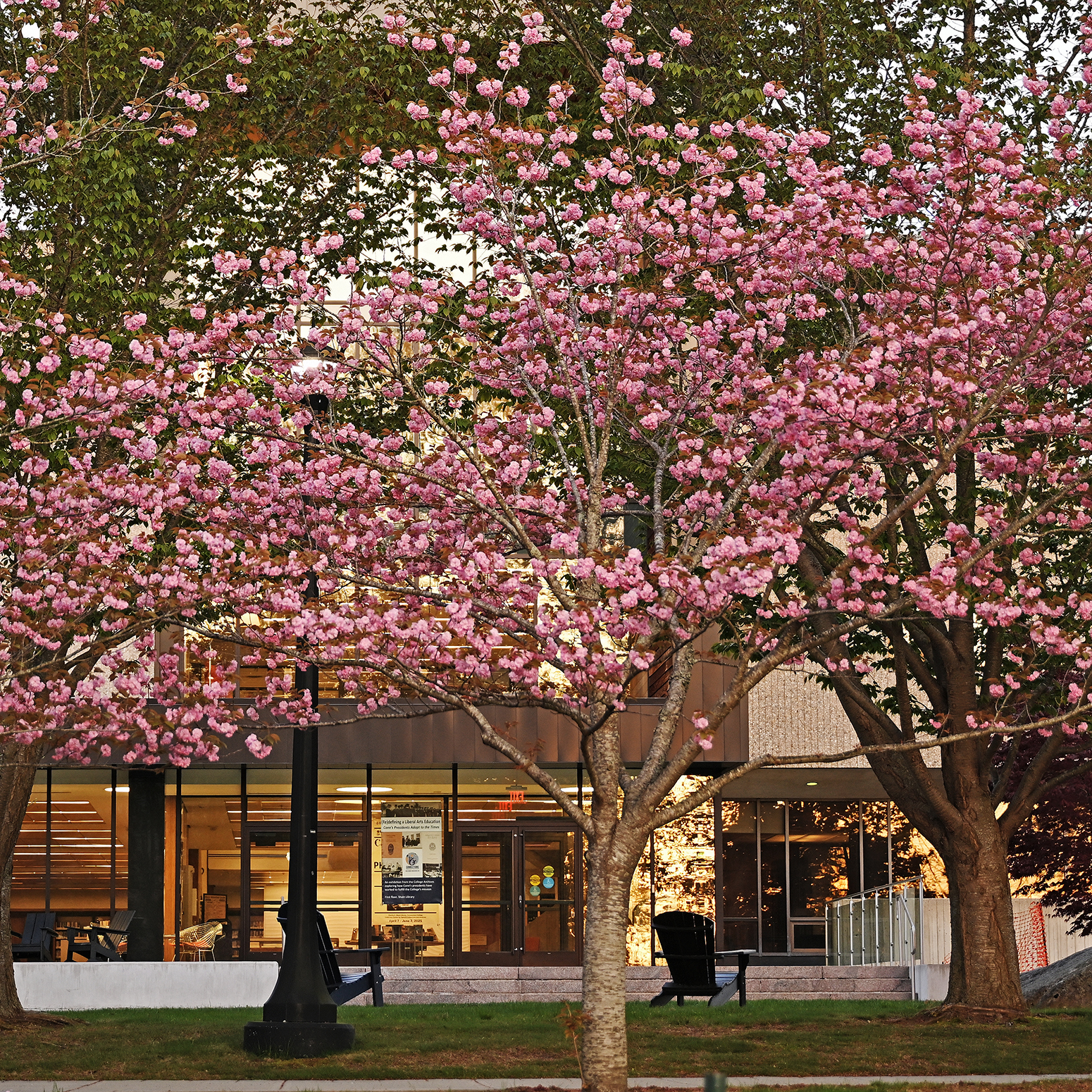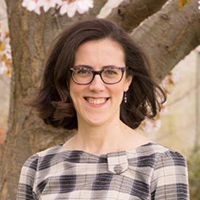
Four honored with Conn’s highest faculty awards
Four Connecticut College professors have been honored with 2024 Faculty Awards for excellence in research, teaching and leadership. The 2024 winners are:
Maria Cruz-Saco, Joanne Toor Cummings ’50 Professor of Economics
NANCY BATSON NISBET RASH FACULTY AWARD FOR EXCELLENCE IN RESEARCH
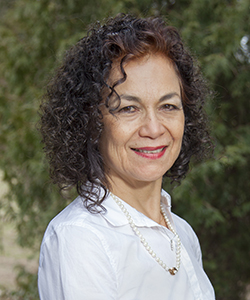
Maria Cruz-Saco is the recipient of the 2024 Nancy Batson Nisbet Rash Faculty Research Award, presented annually to a faculty member selected on the basis of outstanding scholarly or artistic accomplishments. The award was established in 1995 in memory of Nancy Rash, the Lucy C. McDannel ’22 Professor of Art History at Connecticut College from 1972 to 1995.
Cruz-Saco, who joined the Connecticut College faculty in 1990, is a trained macroeconomist/ political economist with a diverse range of interdisciplinary research interests, including open macroeconomics, international finance, development economics, social protection systems, pension schemes, intergenerational transfers, income and access inequality, patriarchal gender norms, occupational segregation, growth and the nature of business cycles. She has published five books, two co-edited volumes and more than 40 journal articles, chapters and working papers. Her work has been supported by several grants and research opportunities afforded by the Fulbright Commission; universities including the Universidad del Pacifico in Lima, Peru; and multilaterals such as the United Nations and the InterAmerican Development Bank.
“Dr. Cruz-Saco is a prolific publisher in English and Spanish, making her already global and impactful contributions reach a broader audience compared to the work of a monolingual,” Associate Professor of Economics Mónika López-Anuarbe wrote in a letter supporting Cruz-Saco’s nomination for the Rash Award. “As a reader and fellow co-author of five publications, I have witnessed her careful attention to detail, high quality control process, writing prowess, comprehensive knowledge of the relevant topic literature and sound empirical approaches. Professor Cruz-Saco adds to the existing literature of her vast fields in multiple ways: as a recognized and technical academic, global consultant and public scholar.”
Mónika López-Anuarbe, Associate Professor of Economics
JOHN S. KING FACULTY AWARD FOR EXCELLENCE IN TEACHING
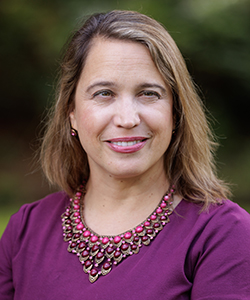
Mónika López-Anuarbe is the winner of the 2024 John S. King Faculty Award for Excellence in Teaching. The award was established to recognize teacher-scholars with high standards of teaching excellence and concern for students. It is named for the beloved professor of German whose warmth and humanity touched all who knew him.
López-Anuarbe, who joined the Conn faculty in 2006, is described by colleagues as an “immensely respected teacher” with an unmatched “ability to challenge, motivate, support and connect with students.”
Known affectionately to her students as “Coach,” López-Anuarbe is a health and inequality economist who specializes in healthcare disparities, strategic thinking, vulnerable communities, the economics of aging and caregiving and, recently, Alzheimer’s disease and related dementias. She teaches economics courses at all levels and has served as the coordinator of the Public Health Pathway, through which she has taught two of the Pathway’s entry courses, “ECON 112: Introductory Economics” and “ECON 240: Health Economics,” as well as the thematic inquiry and senior reflection courses. Additionally, she has advised more than 150 Public Health Pathway scholars.
“Mónika uses an engaging and rigorous approach to produce well-developed integrative learning experiences that springboard students into post-graduate success,” Associate Professor of Sociology Ana Lilia Campos-Manzo wrote in a letter supporting López-Anuarbe’s nomination for the King Award. “What is more, her warmth and enthusiasm for each student as an individual shines brightly. All of their affection and appreciation for her is apparent in their easy interactions and their joyful celebrations with the ‘coach’ of their accomplishments.”
Derek Turner, Class of ’43 Professor of Philosophy
HELEN B. REGAN FACULTY AWARD FOR EXCELLENCE IN LEADERSHIP
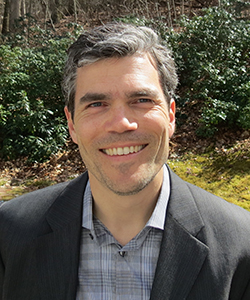
Derek Turner is the recipient of the 2024 Helen Brooks Regan Faculty Leadership Award, presented annually to a tenured faculty member whose outstanding service in a leadership role exemplifies the College’s commitment to shared governance, democratic process and campus community development.
Since joining the Conn faculty in 2001, Turner has worked across campus to strengthen shared governance, increase transparency, improve equity and promote academic freedom. He has served in numerous leadership positions, including as chair and chair-elect of the Faculty Steering and Conference Committee, Faculty Meeting Presider, the Karla Heurich Harrison ’28 Director of the Goodwin-Niering Center for the Environment, chair of the Philosophy Department and co-coordinator of the Joy Shechtman Mankoff Center for Teaching and Learning’s Talking Teaching Series. He also serves or has served on the Priorities, Planning and Budget Committee; the Committee on Appointments, Promotion and Tenure; the Environmental Model Committee; the Academic Continuity Working Group; the COVID Shared Governance Task Force; the Fellowships Committee; and the Behavioral Neuroscience Advisory Committee.
In his field, Turner, whose research focuses on philosophical issues in historical science, especially paleontology and the earth sciences, serves on the editorial boards for Philosophies of Science and Studies in History and Philosophy of Science C: Biological and Biomedical Studies.
In a letter supporting Turner’s nomination for the Regan Award, Associate Professor of Philosophy Simon Feldman praised Turner’s “steady, grounded and empathetic leadership.”
“I would characterize [his approach to leadership] as rational and equitable facilitation of collective conversation and goal-directed collaboration. Mirroring his approach to teaching, Derek’s leadership style also focuses on listening, asking questions and judiciously sharing his expertise,” Feldman wrote. “We, the faculty—and indeed the College—rely on a few colleagues who stand out in their relentless persistence in working to hold our institution to the standards that we all deserve. Derek is one of these colleagues and we are all better for it.”
Rashelle Litchmore, Assistant Professor of Human Development
HELEN MULVEY FACULTY AWARD FOR FOSTERING STUDENT ACHIEVEMENT
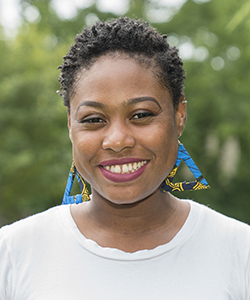
Rashelle Litchmore is the 2024 winner of the Helen Mulvey Faculty Award, presented to an assistant professor who regularly offers classes that challenge students to work harder than they thought they could and to reach unanticipated levels of academic achievement.
Litchmore is a critical cultural psychologist who utilizes a variety of qualitative methods, including phenomenology, ethnography and discursive psychology to study race, culture, identity and social policy. In her courses, “Introduction to Human Development,” “Child Rights/ Public Policy” and “Child and Family Social Policy,” she facilitates students’ understandings of how their own identities and social locations shape their learning experiences, provides opportunities for students to apply academic concepts to real-world settings and designs assignments that require students to synthesize their course understandings through the exploration of novel research questions. She also regularly integrates multimedia tools such as videos, podcasts and images into lectures and assignments to illustrate course concepts and stimulate discussion.
“Professor Litchmore integrates her research—focused on social, political and economic contexts of education policy development and how these broader contexts shape the educational experiences of ethnic and racial minority young people—with the courses she teaches, and, in this way, she is able to mentor students not only in an instructor role but also as a research mentor and supervisor,” Associate Professor of Human Development Loren M. Marulis wrote in a letter supporting Litchmore’s nomination for the Mulvey Award. “She provides students with a comfortable, inclusive and appropriately challenging learning environment while discussing important, complex, and often emotionally and cognitively challenging content.”
